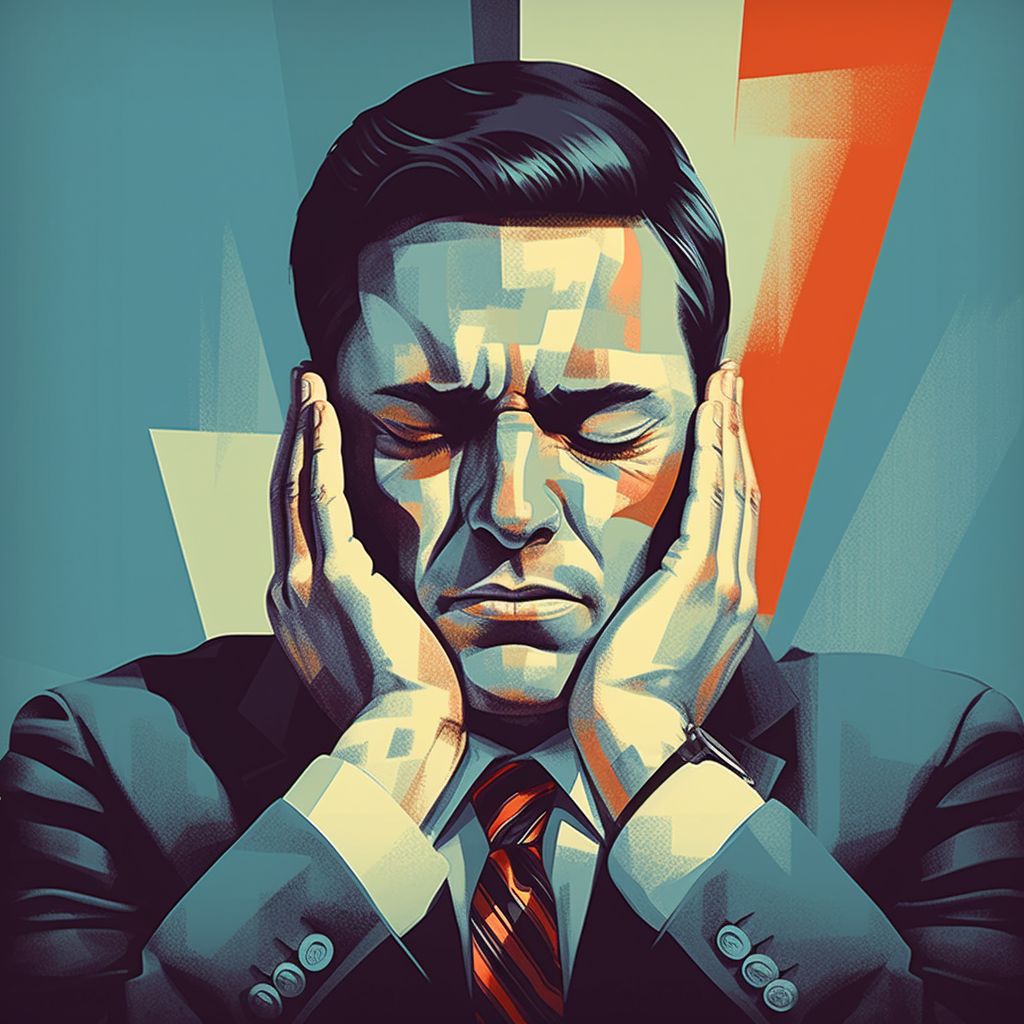ENTJ and Depression: A Comprehensive Guide

Depression is a widespread and often silent struggle that touches the lives of millions worldwide. It doesn’t discriminate, affecting people from all walks of life, including those with different personality types. In our quest to understand this complex mental health challenge, we turn to the Myers-Briggs Type Indicator (MBTI), a tool that helps us comprehend the unique ways individuals perceive the world and make decisions.
In this exploration, our focus is on the ENTJ personality type and the intriguing question: could there be a connection between ENTJ and depression? Let’s delve into this topic, guided by scientific evidence.
The ENTJ Personality Type
To understand the potential link between ENTJ personality and depression, let’s first get to know the ENTJ type according to the Myers-Briggs Type Indicator (MBTI). This insight can help us grasp their unique traits, strengths, and weaknesses.
Overview of ENTJ Personality Type
The ENTJ is often described as the “Commander” or “Executive.” They are natural-born leaders who thrive in organized, goal-oriented environments. Here are some key characteristics that define the ENTJ:

Key Traits and Characteristics
- Extraversion (E): ENTJs are outgoing and assertive. They enjoy social interactions and often take the lead in group settings.
- Intuition (N): They have a strong preference for thinking about the big picture and future possibilities. This trait makes them excellent strategists.
- Thinking (T): ENTJs are logical and objective decision-makers. They base their choices on rational analysis rather than emotions.
- Judging (J): These individuals are structured and organized. They prefer planned approaches to tasks and projects.
Strengths of ENTJs
- Leadership Skills: ENTJs are natural leaders who can motivate and inspire others to achieve goals.
- Strategic Thinkers: They excel at seeing the larger picture and can devise effective plans to reach their objectives.
- Confidence: ENTJs are often confident and assertive, which can be beneficial in various aspects of life.
Weaknesses of ENTJs
- Impatience: Their drive for results can sometimes lead to impatience with slower-paced individuals or processes.
- Bluntness: ENTJs’ direct communication style may come across as harsh or insensitive to others.
- Difficulty with Emotions: They may struggle with recognizing and dealing with their own emotions and those of others.
Now that we’ve explored the ENTJ personality type, we can delve deeper into whether these traits might influence the experience of depression and how this connection has been studied and understood.
Depression: An Overview
Before we explore the potential connection between the ENTJ personality type and depression, it’s crucial to understand what depression is, its different forms, the signs to watch out for, and the importance of seeking help.

Defining Depression and Its Forms
Depression, often referred to as Major Depressive Disorder (MDD), is a mental health condition characterized by persistent feelings of sadness, hopelessness, and a loss of interest or pleasure in daily activities. It can manifest in various forms, including:
- Major Depression: This is the most common form and involves severe symptoms that interfere with daily life.
- Persistent Depressive Disorder (Dysthymia): A milder but long-lasting form of depression lasting for at least two years.
- Bipolar Disorder: Individuals with bipolar disorder experience episodes of depression along with manic or hypomanic episodes.
Common Symptoms and Indicators of Depression
Depression can manifest differently in each individual, but some common symptoms and indicators include:
- Persistent feelings of sadness, emptiness, or hopelessness.
- Loss of interest or pleasure in hobbies and activities once enjoyed.
- Changes in appetite and weight.
- Sleep disturbances (insomnia or oversleeping).
- Depression and low energy or fatigue.
- Feelings of worthlessness or excessive guilt.
- Difficulty concentrating or making decisions.
- Recurrent thoughts of death or suicide.
Addressing depression is of paramount importance because it can have a profound impact on a person’s life and overall well-being. Left untreated, depression can lead to a range of negative consequences, including:
- Impaired relationships with family and friends.
- Decline in work or academic performance.
- Increased risk of physical health problems.
- Elevated risk of substance abuse.
- Higher likelihood of self-harm or suicide.
It’s essential to remember that depression is a treatable condition, and seeking help is a sign of strength, not weakness. Timely intervention, such as therapy, medication, or a combination of both, can significantly improve one’s quality of life.
Now that we have a solid understanding of depression, we can explore how it intersects with the ENTJ personality type and whether certain traits may influence the risk or experience of depression among individuals with this personality type.
| Read more: Depression and Motivation: Coping Strategies for Lack of Motivation
ENTJ Traits and Vulnerabilities
Now, let’s dive deeper into the specific personality traits of ENTJs and how these traits might influence their vulnerability to depression.

Exploring ENTJ Personality Traits
ENTJs are known for their distinct traits, some of which can make them susceptible to certain challenges, including depression. Here are key aspects of the ENTJ personality:
- Extraversion: ENTJs are extroverts, which means they gain energy from social interactions and often thrive in group settings. They tend to be outgoing, assertive, and driven.
- High Standards: ENTJs are renowned for their lofty standards, both for themselves and those around them. They set ambitious goals and expect excellence.
- Need for Control: ENTJs have a strong desire for control and structure in their lives. They prefer planned and organized approaches to tasks and projects.
- Competitiveness: They are often highly competitive individuals who strive to outperform others and achieve their objectives.
- Problem-Solving Skills: ENTJs excel at logical and strategic thinking. They are natural problem solvers and are quick to find solutions to challenges.
How ENTJ Traits Can Play a Role in Depression
While these traits can be assets, they can also contribute to vulnerabilities when it comes to depression:
- Perfectionism: ENTJs’ high standards and desire for excellence can lead to perfectionism, where any perceived failure or imperfection can be emotionally distressing. This can be a significant source of stress and anxiety.
- Overcommitment: Their competitive nature and drive can sometimes lead them to take on too much, leading to burnout and exhaustion.
- Difficulty with Emotions: ENTJs’ preference for logic and problem-solving may make it challenging for them to navigate and express their emotions, potentially leading to emotional suppression.
It’s important to note that while these traits may contribute to vulnerability, they do not guarantee depression. The development of depression is influenced by a combination of factors, including genetics, life experiences, and social support.
In the next section, we will explore the research and evidence regarding the potential link between ENTJ and depression to gain a clearer understanding of this relationship.
| Discover: INFP and Depression | What is the Connection?
The ENTJ and Depression Connection
To understand the potential link between ENTJ personality traits and depression, let’s delve into the existing research and studies that have explored this correlation, along with any relevant statistics and findings.
While the Myers-Briggs Type Indicator (MBTI) is a widely recognized tool for understanding personality types, there is limited direct research linking specific personality types, including ENTJ, to depression. Personality and mental health are complex interplays of genetics, environment, and individual experiences. However, some studies have explored personality traits in relation to mental health outcomes, offering insights into potential connections.

Findings and Statistics
A study published in the “Journal of Personality and Social Psychology” (2008) examined the relationship between personality traits and mental health. While it didn’t specifically focus on ENTJs, it found that traits such as high neuroticism (emotional instability) were associated with increased risk of depression. ENTJs, with their tendency toward emotional suppression, might be at risk if they don’t address their emotional needs.
Another study published in the “Journal of Applied Psychology” (2009) explored the impact of work-related stress on individuals with different personality types. While not specific to ENTJs, it highlighted that personality traits can influence how individuals cope with stress. ENTJs’ need for control and high standards may make them more susceptible to stress-related mental health challenges if they feel unable to meet their own expectations.
Factors Exacerbating Depression in ENTJs
- Stress: ENTJs often lead busy, demanding lives. Their drive for success and leadership roles can expose them to high levels of stress, a known risk factor for depression.
- Perfectionism: The pursuit of excellence can lead to perfectionism, and the fear of not meeting their own standards can be emotionally taxing.
- Isolation: Despite their extroverted nature, ENTJs may isolate themselves when struggling emotionally due to their difficulty with expressing vulnerability.
- Career Pressures: ENTJs often hold leadership positions that come with great responsibilities. The pressure to perform consistently at a high level can contribute to stress and burnout.
| Suggestion: Social Isolation in Depression: Overcoming & Connection
It’s important to remember that personality traits are just one piece of the puzzle. Individuals with ENTJ traits can and do lead fulfilling lives without experiencing depression. However, recognizing their vulnerabilities and seeking support when needed is crucial for their mental well-being.
Coping Mechanisms for ENTJs
For ENTJs who may be facing the challenges of depression or are at risk, there are practical coping strategies that can help them navigate these difficulties and find their way to brighter days.

Practical Advice and Coping Strategies
- Acknowledge and Accept Emotions: Recognize that it’s okay to experience a wide range of emotions, including vulnerability and sadness. Suppressing emotions can exacerbate feelings of depression.
- Set Realistic Goals: While ambition is admirable, setting achievable goals can prevent overwhelming stress. Break larger objectives into smaller, manageable tasks.
- Seek Professional Help: Don’t hesitate to reach out to a mental health professional, such as a therapist or psychiatrist. Therapy can provide valuable tools for managing depression and addressing underlying issues.
- Build a Support Network: Engage with friends and family who can offer emotional support. Sharing your feelings and experiences with trusted individuals can be cathartic.
- Practice Self-Care: Prioritize self-care routines that include adequate sleep, a balanced diet, regular exercise, and relaxation techniques like meditation or mindfulness.
- Time Management: Efficiently manage your time to avoid becoming overwhelmed with work or personal commitments. Learning to say “no” when necessary is crucial.
Explore the unique approach of ENTJ personalities in our article on ‘ENTJ Depression,’
then dive into ‘Self-Care for Depression‘ for essential healing strategies.
Start your journey to self-discovery and well-being today!
Seeking Help and Support
If you or someone you know, whether an ENTJ or of any personality type, is struggling with depression, it’s crucial to seek help and find the support needed to navigate through these challenging times.
- Therapy: The guidance of a mental health professional is invaluable in addressing depression. Cognitive-behavioral therapy (CBT), psychotherapy, and other evidence-based approaches can provide effective tools for managing and overcoming depression.
- Psychiatry: In some cases, medication prescribed by a psychiatrist may be necessary to manage depression symptoms. A combination of therapy and medication can be highly effective.
- Support Groups: Many communities offer support groups for individuals facing depression. These groups provide a safe space to share experiences and coping strategies.
Remember, reaching out for help is a sign of strength, not weakness. Depression is a treatable condition, and with the right support, many individuals can regain their emotional well-being and lead fulfilling lives.
HealWiser’s Last Piece of Advice
In this blog, we discussed the connection between ENTJ and depression. Depression is a complex condition that can affect anyone, regardless of personality type. It’s essential to remember that seeking help is a sign of strength. Professional support, therapy, and the embrace of a support network can make a significant difference in the journey to recovery.
Addressing depression within the context of personality types offers a unique perspective and a path toward tailored interventions. To ENTJs and all those facing depression, there is hope, and there is help available. Remember, you are not alone on this journey, and brighter days await.
Sharing your experiences can provide valuable insights and emotional support. So…
…share your story with HealWiser and others in the comments section below this post.






